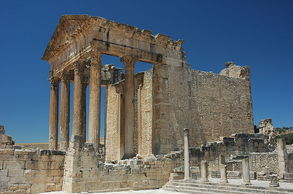
It's pretty common for people to say thing like, "Well, the biblical authors couldn't have imagined ___________________." Go ahead, fill in the blank. I hear this most often in discussions around same-sex marriage. "Biblical authors couldn't have imagined loving, monogamous same-sex relationships."
But I often want to respond: are you sure? Or is it just that you can't imagine that biblical authors could have imagined the scenario you mention?
After all, modern folks tend to look down their nose at people from most other times and places in history. We have, after all, made it through the Enlightenment and we continue to progress, do we not? Aren't we on the right side of history just by virtue of having the good luck of being born when we were?
Now, I'm all for recognizing how our place and time shapes what we can and can't imagine. That's true for the human authors of Scripture (although we need a good doctrine of inspiration here as well, affirming the Holy Spirit's work; but that's a post for another time). But we also need to recognize it's true for us.
If you can't imagine that biblical authors could have imagined a variety of sexual and relational possibilities and that they could have identified many of them as sinful, perhaps that says more about your imagination or about our collective imagination than about biblical authors of the ancient world.
So what if I told you that there are examples of monogamous, loving, non-abusive, same-sex relationships in ancient Greek and Roman culture? What if biblical authors didn't have to "imagine" these possibilities but knew of their reality and spoke against them (just as they did a host of other opposite-sex sexual possibilities in the ancient world)?
Can you imagine that? If not, we should at least be honest enough to revise our view of who is really lacking in imagination.
But I often want to respond: are you sure? Or is it just that you can't imagine that biblical authors could have imagined the scenario you mention?
After all, modern folks tend to look down their nose at people from most other times and places in history. We have, after all, made it through the Enlightenment and we continue to progress, do we not? Aren't we on the right side of history just by virtue of having the good luck of being born when we were?
Now, I'm all for recognizing how our place and time shapes what we can and can't imagine. That's true for the human authors of Scripture (although we need a good doctrine of inspiration here as well, affirming the Holy Spirit's work; but that's a post for another time). But we also need to recognize it's true for us.
If you can't imagine that biblical authors could have imagined a variety of sexual and relational possibilities and that they could have identified many of them as sinful, perhaps that says more about your imagination or about our collective imagination than about biblical authors of the ancient world.
So what if I told you that there are examples of monogamous, loving, non-abusive, same-sex relationships in ancient Greek and Roman culture? What if biblical authors didn't have to "imagine" these possibilities but knew of their reality and spoke against them (just as they did a host of other opposite-sex sexual possibilities in the ancient world)?
Can you imagine that? If not, we should at least be honest enough to revise our view of who is really lacking in imagination.
 RSS Feed
RSS Feed